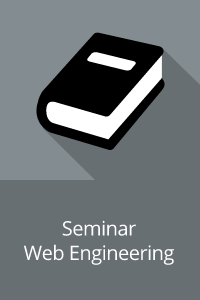
Seminar Web Engineering (WS 2018/2019)
Welcome to the homepage of the Seminar Web Engineering
This website contains all important information about the seminar, including links to available topics as well as information about the seminar process in general.
The interdisciplinary research area Web Engineering develops approaches for the methodological construction of Web-based applications and distributed systems as well as their continuous development (evolution). For instance, Web Engineering deals with the development of interoperable Web Services, the implementation of web portals using service-oriented architectures (SOA), fully accessible user interfaces or even exotic web-based applications that are voice controlled via the telephone or that are represented on TV and Radio.
The following steps are necessary to complete the seminar:
- Preparation of a presentation about the topic assigned to you.
- An additional written report of your topic.
- Each report is reviewed by two or three other particpants.
Seminar chairs


Contact
Participants
The seminar is offered for students of the following programmes (for pre-requisites, please refer to your study regulations):
- Bachelor Informatik (Proseminar 500110 /Hauptseminar 500070)
- Bachelor Angewandte Informatik (Proseminar 500110 / Hauptseminar 500270)
- Bachelor Informatik und Kommunikationswissenschaften (Hauptseminar 500070)
- Informatik für Sozial- und Geisteswissenschaftler (Proseminar 500110 /Forschungsseminar 500090)
- Master Informatik (Forschungsseminar M_01)
- Master Angewandte Informatik (Forschungsseminar 500090)
- Master Web Engineering (Seminar Web Engineering 500410)
If your programme is not listed here, please contact us prior to seminar registration and indicate your study programme, the version (year) of your study regulations (Prüfungsordnungsversion) and the module number (Modulnummer) to allow us to check whether we can offer the seminar for you and find an appropriate mapping.
Registration
You may only participate after registration in the Seminar Course in OPAL
Themen (und VSR-Ansprechpartner)
Fragen:
- What is a Transpiler and why is it needed?
- How do they work?
- What different Transpilers exist and how to they compare to each other?
Fragen:
- What is it?
- What is it used for?
- Advantages/Disadvantages? Implementations?
- Alternatives?
Literatur:
Fragen:
- What is DNS?
- How des DNSSEC extend DNS?
- Why should one use DNSSEC?
- Alternatives?
- Attackvectors?
Fragen:
- What is Kotlin?
- Name it's distinctive advantages over the other languages.
- What are the applications.
Literatur:
Fragen:
- What is different in comparison to HTTP/1.1?
- Which challenges does it adress?
- What is HTTP/2 Server Push?
Fragen:
- Summarize the two recommendations
- Provide an example scenario using those approaches
Fragen:
- What are serverless applications?
- Pros and cons?
- Comparision to regular server-based application?
- Who is offering serverless applications and how?
- Use cases?
Literatur:
- Amazon Lambdas
- Google Cloud Functions
- Own Research
Fragen:
- What are the different algorithms used to rank resources?
- Comparison between existing algorithms.
- How can we rank ontologies using ranking algorithms?
Literatur:
- Own Research
Fragen:
- What is semantic interoperability?
- How can semantic interoperability be achieved in the IoT domain
- Use-cases and scenarios?
Fragen:
- What is policy-based Trust?
- How and where is it curently used in the web?
- What are advantages and disadvantages?
Fragen:
- What is reputation-based Trust?
- How and where is it curently used in the web?
- What are advantages and disadvantages?
Fragen:
- What is a microservice?
- What are benefits and disadvantages of microservices?
- Orchestration or Coreography?
- How can nanoservices be avoided?
Literatur:
- https://link.springer.com/chapter/10.1007/978-3-319-67425-4_12
- https://ieeexplore.ieee.org/abstract/document/7030212
- https://www.researchgate.net/profile/Christoph_Hochreiner/publication/324517504_Proceedings_of_the_10th_ZEUS_Workshop/links/5ad1c5e9458515c60f5054d3/Proceedings-of-the-10th-ZEUS-Workshop.pdf
- page=8
Fragen:
- What is SoLiD?
- What are it's applications and use-cases?
- Comparison to other similar technologies?
Literatur:
- https://solid.mit.edu/
- Own Research
Fragen:
- Which Performance Metrics (KPI vs. OKR) are used to measure the Productivity of Activites in IT Product Development Process?
- Is there any categories or classification depends on market segment, company size?
- Is there any Software Framework could provide a holistic OKR approach?
- Market overview?
Literatur:
- Hailey, J. &. S. M., 2004. 'Measuring Success: Issues in Performance Management. Oxford: INTRAC.
- How Google sets goals with OKR's – objectives and key results https://blog.weekdone.com/how-google-sets-goals-with-okrs-objectives-and-key-results/ Gothelf , J. & Seiden, J., 2012.
- Lean UX: Applying Lean Principles to Improve User Experience. Sebastopol, CA 95472: O'Reilly and Associates
- New Directions in Goal-Setting Theory https://www.researchgate.net/publication/237602737
Fragen:
- Which Goal-setting Methods are fitting in the IT sector? Is there any categories or classification depends on market segment, company size?
- What is the main Principles of Goal Setting?
- How can a software framework create a link between Goals and effective operation?
Fragen:
- Explain the need for such languages.
- Present and compare different approaches.
- Give recommandations.
Literatur:
- WSDL
- WADL
- OpenAPI
- RAML
- APIBlueprint
- Own Research
Fragen:
- Why should one test web applications?
- What are the challenges?
- What approaches exist?
- Present exampes with features and limits.
Literatur:
- https://en.wikipedia.org/wiki/Web_testing
- Own Research
Fragen:
- What is it?
- What are advantages and disadvantages of Semantic User Interfaces?
- How is it related to Linked Data Platform applications?
Seminar Opening
If you have not done this so far, please register in the VSR Seminar Workflow System.
The slides of the seminar opening are available here.
Short Presentation
In your short presentation, you will provide a brief overview on your selected topic.
This includes the following aspects:
- What is in your topic?
- Which literature sources did you research so far?
- What is your idea for a demonstration?
The short presentation should be no longer than 3 slides (in addition to your title slide) and take max. 5 minutes. Following your short presentations, the advisors will provide you with feedback and hints for your full presentations.
Hints for your Presentation
- As rule of thumb you can plan for 2 minutes per slide. Significantly more slides per minute can be difficult to perceive for the audience.
- Prior to creating your presentation, you should think about: What should be the main message of my presentation? What should the audience remember after my presentation?
Based on these considerations you should create your presentation. - Here you can find some useful hints http://www.garrreynolds.com/Presentation/
Seminar Days
The seminar presentations will be held in half-day blocks.
Monday, 10/12/2018 13:00 - 17:00 in 1/367
Wednsday, 12/12/2018 13:00 - 17:00 in 1/205
Thursday, 13/12/2018 13:00 - 16:00 in 1/219
Report
- Important hints on citing:
- Any statement which does neither belong to general knowledge nor stem from the author has to be provided with a reference to its original source.
- "When to Cite Sources"- Good overview by Princeton University
- Examples for citations can be found in the IEEE Citation Reference
- Web References have to be cited with author, title, date, URL and date of last access. Examples:
- [...] M. Nottingham and R. Sayre, "The Atom Syndication Format - Request for Comments: 4287", 2005. [Online]. Available: http://www.ietf.org/rfc/rfc4287.txt. [Accessed: Feb. 18, 2008].
- [...] Microsoft, "Microsoft Office SharePoint Server 2007 Homepage", 2007. [Online]. Available: http://office.microsoft.com/en-us/sharepointserver/. [Accessed: Jan. 02, 2007].
- The url has to be included as a hyperlink ("clickable") if technically possible.
- Further Information and Hints:
- Please use, as far as possible, the HTML elements which are used in the template. Changes to the CSS file are not allowed and will be ignored.
- Carefully check spelling and grammar of your reports, preferably using software support such as OpenOffice, Microsoft Word or LanguateTool, before uploading it.
- Check that your HTML is valid using the W3C Validator
Review
- Each seminar participant has to review exactly three reports. The reviews are not anonymous.
- Use the review forms provided in the VSR Seminar Workflow, one per report.
- Following the review phase, each seminar participant will receive the three peer reviews of his report and, if necessary, additional comments by the advisors. You will then have one more week to improve your report according to this feedback.
- The seminar grade will consider the final report.
All comments in the reviews are for improving the text and therefore in the interest of the author.


